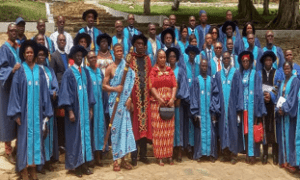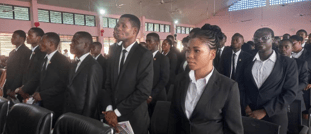By Evelyn ARTHUR
At least five out of every six children with disabilities in Ghana aged six upward face marginalisation in accessing inclusive education, a situation experts say needs urgent redress.
Even among the 50 percent of persons with disabilities (PWDs) who manage to access education, many are excluded from policy decisions that directly affect them; further deepening inequities in the system.
Ghana’s representative to the International Council for Education of Persons with Visual Impairment and Deafblindness, Mrs. Regina Oppong, highlighted this concern by referencing a 2018 UNICEF report.
Speaking as Guest Speaker at the 17th matriculation of the Presbyterian College of Education in Mampong-Akuapem, Eastern Region, she lamented the ongoing neglect of PWDs in education.
Addressing the theme ‘One Vision, Many Voices; Advancing Teacher Education’, Mrs. Oppong likened inclusive education to a symphony in which multiple instruments must work together to produce harmony.
“True education requires a shift from outdated norms and the embrace of diverse perspectives, as no single voice holds all the answers,” she stressed.
Mrs. Oppong, who also heads the Department of Special Education at Okuapeman Senior High School, called for an end to the practice of making decisions for PWDs without their input.
She urged stakeholders – including educational institutions, parents, government and religious bodies – to take deliberate steps in ensuring genuine inclusiveness.
Presbyterian College of Education faces resource challenges
Principal-Presbyterian College of Education, Rev. Dr. Nicholas Apreh Siaw, reaffirmed the college’s commitment to special education.
As one of only two institutions in Ghana offering specialised training for teachers of students with disabilities, the college has consistently admitted a significant number of special students.
However, he lamented the lack of adequate resources for training these students. “Our resource centre is small and our equipment is insufficient. We need more resources to train special students effectively. Authorities must recognise the college’s vital role in inclusive education and provide the necessary support,” he appealed.
Rev. Dr. Siaw also criticised the current practice of admitting special students under the same conditions as general students, stating that such an approach fails to cater for their unique needs. “It is unacceptable to treat special students like general students.
“They require tailored support to maximise their potential for self-reliance and nation-building,” he stated.
He encouraged the new teacher trainees to embrace critical thinking, skill acquisition and responsiveness to societal and cultural needs to promote diversity.

Additionally, he urged government to extend scholarships to the 2024/2025 special education students, as was done for the previous cohort.
For the 2024/2025 academic year, Presbyterian College of Education has admitted 520 teacher trainees including 28 special students.










